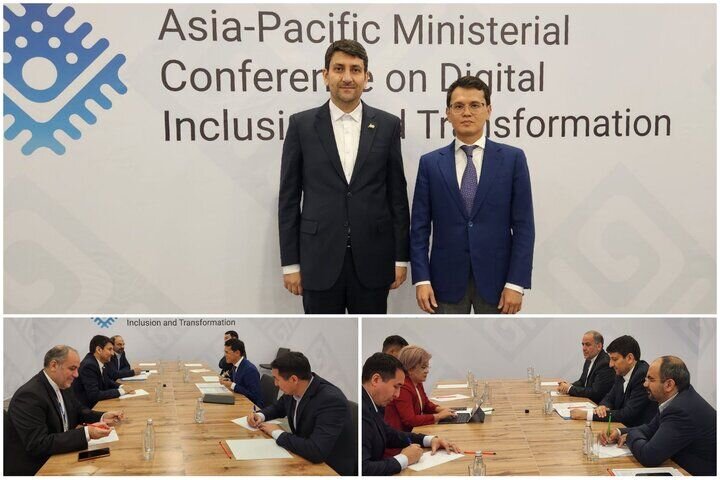Iran to boost ICT ties with Kazakhstan, Kyrgyzstan

TEHRAN – Information and Communication Technology (ICT) Minister, Sattar Hashemi, in separate meetings with his Kazakh and Kyrgyz counterparts, explored ways to foster cooperation in the ICT field.
The officials met on the sidelines of the Asia-Pacific Ministerial Conference on Digital Inclusion and Transformation held from September 3 to 5 in Astana, Kazakhstan, Mehr news agency reported.
Kazakh Minister of Digital Development, Innovation and Aerospace Industry, Zhaslan Madiyev, and Hashemi exchanged views on enhancing cooperation in technology infrastructure, e-government, and research cooperation, IRNA reported.
Also, Bagdat Batyrbekuly Musin, the chairman of the Board of Kazak Telecom, offered specific recommendations for expanding cooperation between the two countries. The proposals will be examined and a joint working group will be formed over the course of a month to follow up on the cooperation between Kazakh Telecom and Iranian operators.
Moreover, Minister of Digital Development of the Kyrgyz Republic, Nuria Kutnaeva, expressed interest in defining joint projects and developing scientific cooperation. The official emphasized the necessity of cooperation in the field of ICT in addition to economic and cultural collaborations of the two countries.
During the meeting, the two sides welcomed cooperation in local platforms and postal affairs and decided to prepare a draft of a memorandum of understanding in this regard.
The Economic and Social Commission for Asia and the Pacific (ESCAP) is the most inclusive intergovernmental platform in the Asia-Pacific region.
The Commission promotes cooperation among its 53 member States and 9 associate members in pursuit of solutions to sustainable development challenges. ESCAP is one of the five regional commissions of the United Nations.
Attending ESCAP meeting, Hashemi met Armida Salsiah Alisjahbana, Executive Secretary of the UN ESCAP. Referring to previous cooperation between Iran and ESCAP, the officials expressed optimisim to organize a joint project on the role of technologies in addressing natural disasters.
Asia-Pacific Ministerial Conference
The ministerial conference considers a blueprint for regional cooperation, which is imperative to accelerate digital innovation for sustainable development.
This year, it brought together government leaders and ministers from across Asia and the Pacific, as well as other key stakeholders, to discuss how digital inclusion and transformation can accelerate sustainable development in the region.
The ministerial conference also aimed to foster digital cooperation among members and associate members in order to bridge the digital divide, ensure the provision of digital skills training, strengthen digital connectivity, address and enhance digital trust and security, share good policies, practices and lessons learned, and promote inclusive digital economies and societies.
Status of ICT in Iran
The Ministry of Information and Communication Technology is the highest authority in the field of ICT in the country. All activities related to the information and communication technology industry are directly related to the ministry.
The government pays special attention to plans and policies in this sector in order to maximize the use of ICT to facilitate people's lives.
The successful designing, building, and launching of a satellite show the growth of the national technology and scientific power of a country.
Space technology has been considered a tool to expand prosperity, peace, scientific-cultural development, and economic progress in human societies.
Different nations of the world exploit this technology in some way based on their capacity, capabilities, and efforts.
Currently, 13 universities and a research institute affiliated to the Ministry of Science, Research and Technology are offering aerospace majors, thus Iran has a high capability in training specialists and experts in the aerospace sector and is a leading country in the region.
Access to telecommunication services in rural areas of the country had improved over the period as the overall number of villages with access to communication services rose to 52,182, around 93 percent of all villages, while 47,837 villages had access to home landline services.
Moreover, the number of Iranian mobile users reached nearly 135.890 million, according to the CRA which put the mobile phone penetration rate in the country at 161.67 percent.
The figures showed, however, that fixed broadband adoption in Iran had stalled at 14 percent with nearly 11.921 million customers having access to the Internet via those services.
This statistic shows that fixed broadband internet has grown by less than 2 percent compared to last year and mobile internet has experienced a growth of 10 percent. However, it can be said that the speed of mobile internet expansion is 5 times the speed of fixed internet.
MT/MG
Leave a Comment